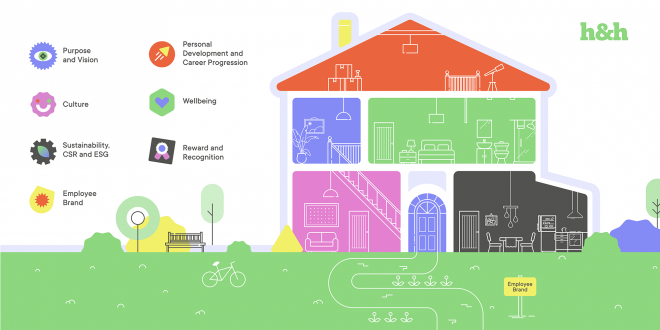
25th April 2024
Guest Blog: Are QWL and CSR mutually important for workplace success?

This guest blog was written by our Inspiring Workplaces intern Ewan Meissl.
In today’s business world, two concepts stand out as being crucial for companies concerned about their impact and, above all, their longevity. These concepts are Quality of Work Life (QWL) and Corporate Social Responsibility (CSR). At first glance, QWL and CSR might appear to be initiatives aimed merely at improving employee well-being and a company’s societal engagement, respectively. However, my analysis will demonstrate that there is a link between these two notions. How can improving one lead to significant advancements in the other? I will explain why a business strategy that incorporates both QWL and CSR is not just seen as a trend or secondary concern but is indeed essential for sustained success.
The boundation of QWL
QWL is defined by the National Interprofessional Agreement on Professional Equality and Quality of Work Life as “the conditions under which employees carry out their work, and their capacity to express themselves and act on the content of it, which determine the resulting perception of the quality of work life.
The basis of CSR
Corporate Social Responsibility encompasses ethical practices, consideration of social and environmental impacts, promotion of human rights, and engagement with stakeholders. CSR aims to integrate the principles of sustainable development into business activities and management, seeking to reconcile economic performance with social and environmental responsibility.
If you decide to improve the work environment, you might notice a direct impact on employee satisfaction and motivation. This positively influences the company’s performance, which notably respects one of the pillars of CSR. By involving employees in decision-making processes while valuing their well-being, companies promote an ethical and inclusive work environment, strengthening their social responsibility within the company itself.
Implementing QWL, a gateway to productivity
QWL is not limited to providing a pleasant work environment; it establishes a strategic approach aimed at maximizing human potential within the organisation. Research shows that a happy and fulfilled employee is significantly more productive. This increase in productivity leads to a significant decrease in absenteeism, a reduction in turnover, and an improvement in employees’ commitment to their work and the company. It also fosters a sense of belonging and team cohesion within the company, establishing a climate of mutual aid and solidarity among employees with a self-overcoming to improve the company’s productivity.
But why, you may ask? I like to use this example that perfectly illustrates the point:
When a football player feels integrated and valued within his team, with strong cohesion and team spirit, he seeks to give his best during training and matches. This collective determination on the field is crucial for achieving victory. Similarly, in the professional world, an employee who is comfortable in his work environment, who maintains good relations with his colleagues and feels supported by his company, is motivated to excel in his functions. Just like the football player who surpasses himself for his team, the committed employee goes above and beyond to contribute to the success of his “team,” the company.
However, several factors contribute to productivity with QWL:
- Health and well-being
QWL contributes to reducing physical and mental health issues, stress, and illnesses, allowing employees to be fully present and engaged in their work. - Work-life balance
The flexibility of schedules and the possibility of teleworking contribute to this balance. This reduces burnout and promotes better concentration and creativity at work while having fulfilled employees. - Autonomy and participation
Granting employees the ability to influence their work and participate in decisions strengthens their sense of belonging and motivation, which translates into increased productivity.
QWL and CSR symbolize the strengthening of Employer Branding and the emergence of a brand image
The importance of Quality of Work Life (QWL) in today’s professional world cannot be understated, with recent studies revealing that 88% of employees consider QWL a priority. This figure demonstrates that employees place their well-being at work at the heart of their concerns, on par with their remuneration or job security. For companies, responding to this growing demand is not just a matter of good managerial practices; it’s a strategic imperative.
In a labour market where the competition to attract and retain talent is fierce, neglecting QWL would risk seeing the most valuable employees leave for a company or even fail to attract young talents. Therefore, investing in QWL is far from being a luxury or an unnecessary expense. It is an essential approach that is part of a long-term vision of human resource management. It allows for the building of a strong company culture, where employee well-being is linked to the organisation’s overall performance. For companies aspiring to longevity and excellence in an ever-changing world, meeting QWL expectations is not just desirable; it’s fundamental.
In conclusion, the interdependence between Quality of Work Life and Corporate Social Responsibility in improving employees’ daily lives is inseparable from a company’s commitment to a fairer and more sustainable society. Companies that recognise and act according to this link are not just investing in their human capital or brand image. They are embarking on a path that leads to durable and shared success for the benefit of all stakeholders. After discussing the benefits of CSR and especially QWL, it would seem logical to explain HOW to implement or establish QWL within your organisation.





